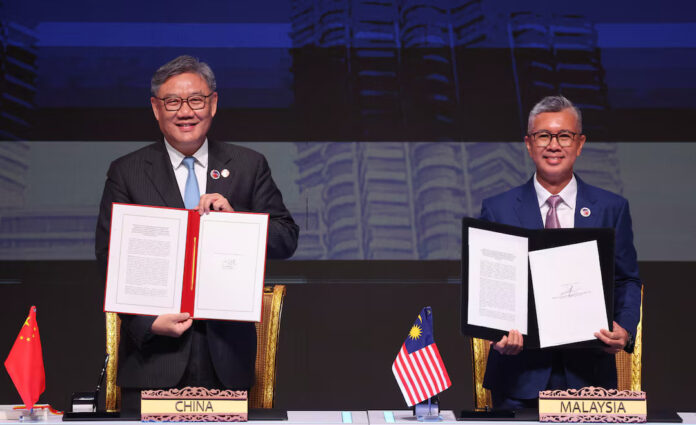
China and the Association of Southeast Asian Nations (ASEAN) on Tuesday signed an upgraded version of their free trade agreement, strengthening economic ties at a time when both sides are grappling with mounting U.S. tariffs.
The new deal, referred to as the “3.0 version” of the ASEAN-China Free Trade Agreement, was signed during a summit of ASEAN leaders in Malaysia, which U.S. President Donald Trump attended on Sunday at the start of his Asia tour.
The upgraded pact introduces new provisions covering the digital economy, green industries, and emerging sectors, aiming to deepen integration between the two sides.
According to ASEAN statistics, China remains the bloc’s largest trading partner, with bilateral trade reaching $771 billion in 2024. The 11-member group, with a combined GDP of $3.8 trillion, has become a key pillar of Beijing’s regional economic strategy as it seeks to counter the effects of Washington’s sweeping import tariffs on global partners.
Negotiations for the upgraded agreement began in November 2022 and concluded in May 2025, shortly after Trump’s latest round of tariff measures took effect. The first ASEAN-China free trade pact was implemented in 2010.
China’s Commerce Ministry has said the agreement will boost market access in agriculture, digital trade, and pharmaceuticals, while fostering cooperation in sustainable development.
Beijing has been promoting itself as an advocate of open markets, even as critics accuse it of restricting exports of rare earths and other strategic minerals.
Both ASEAN and China are members of the Regional Comprehensive Economic Partnership (RCEP), the world’s largest trade bloc encompassing nearly a third of global GDP and population.
Malaysia hosted an RCEP summit in Kuala Lumpur on Monday, the first in five years, where leaders emphasized the need to strengthen regional supply chains amid growing protectionism.
Analysts say the upgraded ASEAN-China deal could serve as a buffer against the economic fallout from U.S. tariffs, though its provisions remain less stringent than those in other regional agreements due to differing national interests among ASEAN members.
Source: Reuters
Written By Rodney Mbua


















